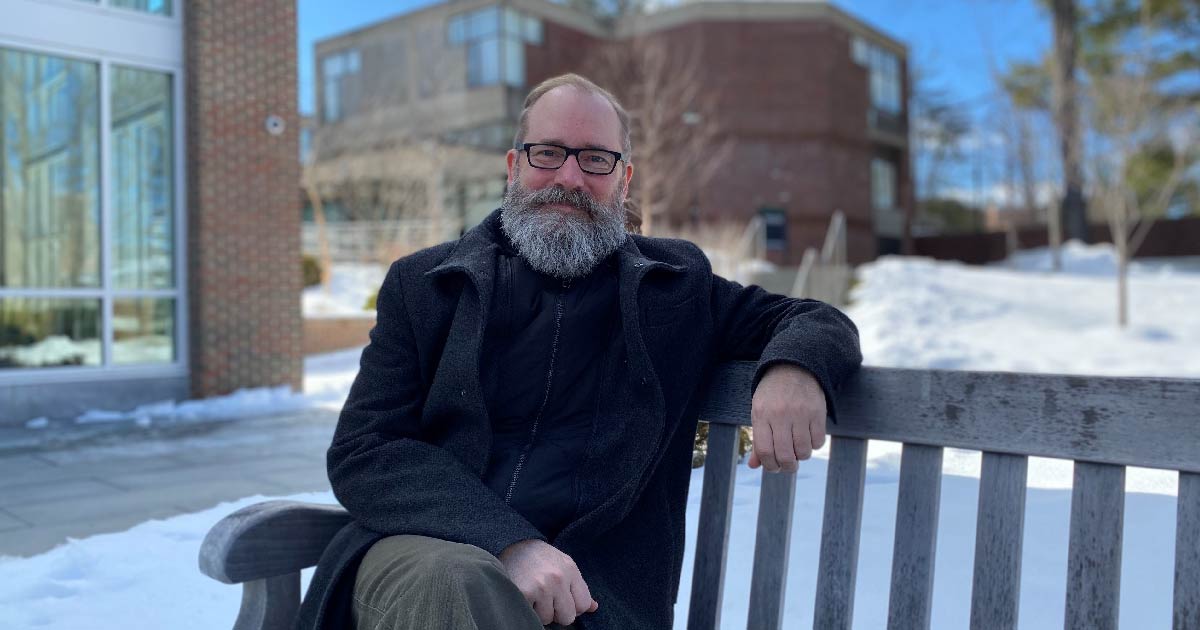Daryl Bullis: Opening Minds Through Academic Research

Daryl Bullis has been working as an academic librarian in higher education for 22 years, nine of them at Babson College. During that time, he has seen students evolve into more engaged citizens who ask challenging questions and demand more of their leaders. While he has witnessed big shifts, some aspects of his work have remained much the same—for example, students still procrastinate. (His advice: Don’t do it!)
Colleagues at Babson have praised Bullis’ ability to sit in on a class and respond thoughtfully to each student’s research idea, “shifting on a dime” depending on the topic and suggesting different lenses through which students might frame their papers.
Bullis also worked as a teacher in Russia just after the Cold War in the early 1990s, teaching U.S. and British history and literature to students in grades 6-11 for UNESCO. He has a master of library science, a bachelor of arts in classics and Russian, and a master of arts in Slavic languages and literature. We asked him to weigh in on the current situation in Ukraine.
The Q&A
How do you guide a student who comes to you with a research topic?
“Students often come for research help because they have already drawn their conclusions about their research topic and they are struggling to find sources to back up their argument. I encourage them to reconsider their approach by asking them to begin with a question, to think of research as inquiry not as a task to fulfill. I like to begin by asking, ‘What is it you really want to discover about your topic?’ By opening up a conversation this way, I can find what motivates them. I then guide them through the body of scholarly research available at Horn Library. There, students encounter an enormous body of ongoing scholarly conversation, and, by engaging with it, build their self-confidence and become stakeholders in that dialogue. Breaking students free from the confines of their preconceived conclusions brings them into the open marketplace of scholarly ideas. When a student leaves our research interaction, my hope is that they walk away being a more curious researcher, critical thinker, and engaged community member.”
What is the No. 1 mistake students make doing research?
“Performing good research and doing due diligence is time-consuming, so we often find the biggest challenge for students is time management. We encourage everyone to reach out to us early to establish a research strategy for their paper or project. In other words, don’t procrastinate!”
Have student research interests and topics changed over the 22 years you have been doing this work?
“Student research interests themselves haven’t changed much, but students’ perspectives and attitudes toward topics certainly have. Students today are looking deeper at the root causes of problems and asking more demanding questions, which naturally generate more complex answers. Instead of asking the what, who, and where questions, they are now asking how and why questions. A few decades ago, a student I was helping might ask, ‘What is the U.S. government policy on climate change?’ Today, that student would ask, ‘How can the U.S. government better combat climate change?’ It’s a subtle, but powerful, change in perspective. Students today demand and expect more from their librarians, their campus, their state, country, and the world. It’s our job to help them find their way to solutions.”
You have lived and worked in Russia. What is your take on the situation in that part of the world now?
“What is unfolding in Russia and Ukraine is heartbreaking. Putin’s invasion comes as no surprise to those of us who have been following Russia over the years, but it is shocking in its sheer brutality and recklessness. The world watched helplessly as Putin invaded Georgia in 2008 and Ukraine in 2014, and yet, here we are again today, talking about the largest military mobilization in Europe since 1945. It is difficult for us here in the U.S. to grasp the long and complex history Russia and Ukraine share, a history Putin has referenced many times in his speeches over the last few years. He is ‘drunk with historical grievance,’ which, he feels, gives him the right to deny Ukrainians their nationhood and, by extension, their language, ethnicity, and identity. As this concerns the U.S. and NATO, Putin has single-handedly and overnight changed the geopolitical landscape in Europe for the next few decades to come.”
Two More for Daryl Bullis
What does Babson mean to you?
“Babson to me is a densely woven and diverse community of curiosity, drive, and compassion.”
Right now, what are you …
- Watching? “‘Outlander,’ Season 6.”
- Reading? “Red Famine: Stalin’s War on Ukraine by Anne Applebaum.”
- Listening to? “Don Carlos by Giuseppe Verdi.”
- Doing in your free time? “I’m an avid music collector, mainly classical and opera, so I spend a lot of time listening to records when I’m stuck indoors. In the warmer months, I enjoy golfing, camping, road trips, and long walks in local parks and preserves.”



